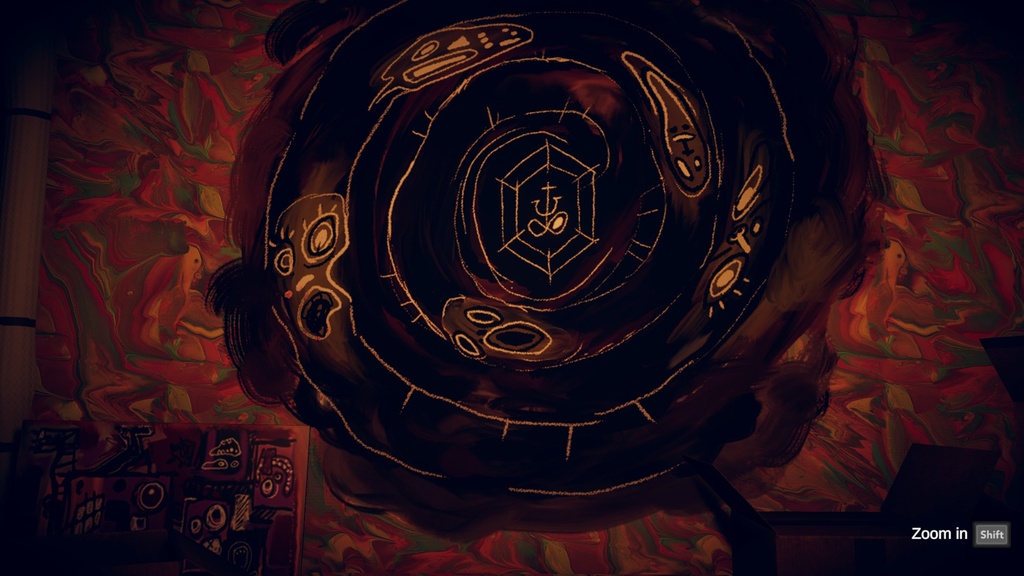Tormenture offers a unique and creative premise: it's a game within a game, with graphics mirroring that of the Atari era. You play as a kid making your way through a game called Tormenture, which involves solving various puzzles, like finding keys to open doorways, and evading enemies. But the game doesn't stay inside its handheld console; instead, it also affects the real world, with the monsters refusing to stay within their digital realm.
Accordingly, you'll occasionally switch back to the real world, where you can interact with your bedroom and the items within it. The game does a great job of blending these two realities, adding to the terror and causing me to question what was really "real" in the context of the game.

When I booted up Tormenture for the first time, I wasn't sure what to expect. When I dove in, it took me a while to figure things out. You're immediately thrown into the Tormenture video game (that aforementioned "game within a game") as you attempt to grab four different Relics and defeat the bosses guarding them. If you've ever played Adventure on the Atari, you'll instantly recognize many elements of the game, since Tormenture is clearly heavily based on the iconic 1980 title. It's a pretty simple premise, but since the game throws you in without any guidance, it can actually take some trial and error to figure out what you're supposed to be doing.
At first, it doesn't seem too scary; sure, there are horror elements like zombie-looking hands grabbing at you and strange enemies in your path, but it's far from terrifying. If anything, the nostalgia factor makes it a little bit comforting. (I was born well after the '80s, but I can still appreciate the aesthetic.) But as you start to realise you need to shift between the real world and the digital one to solve problems, things start to get a lot more unsettling. You realise that you're not just playing the game — you're a part of it. This world-shifting is where the game's horror really shines.
Although it might mimic games from '80s kids' childhoods, the gameplay can, at times, be tough even for adults. The game's lack of guidance is supposed to be part of the charm, and it does add to the horror, but at times it is more frustrating than intriguing. You can easily spend half an hour trying to figure out just what to do in some sections, which is enough for many players to toss the controller down and give up.

But I wanted to see the adventure through (the whole journey is only a few hours long, after all) and thankfully, I eventually found a gameplay guide sitting in a drawer in the "real world." It's full of info on how to play the game, and even hints to puzzles. It's a pretty cool find, and is definitely satisfying to add to your collection, but I can't help but wish that the developers would have made it a little easier to find. Players could focus on diving into the horror rather than lamenting over which button to press.

While I eventually got the hang of the gameplay, the plot remained a mystery all the way throughout. In most horror games, I often feel frustrated when developers over-explain the story, leaving little room for interpretation. Stephen King captured my feelings perfectly: "Nightmares exist outside of logic, and there's little fun to be had in explanations; they're antithetical to the poetry of fear." However, in Tormenture, I found myself wishing for a little more explanation. The game hints at an intriguing narrative and puts players into a setting that left me wanting more, but it leaves too many gaps to feel satisfying or deeply memorable.
I wanted to love Tormenture and in some ways, I did, but in others I was left disappointed. Tormenture is a great homage to ‘80s games and does a fantastic job of building psychological horror. The shifting between realities is a brilliant concept, and the sense of dread builds effectively throughout, but the lack of a clear narrative and frustrating trial-and-error gameplay make it hard to fully immerse myself in the experience. While I respect its ambition, Tormenture leaves more questions than answers, and that’s both its greatest strength and its biggest flaw.

 No ads, our video library,
No ads, our video library,


